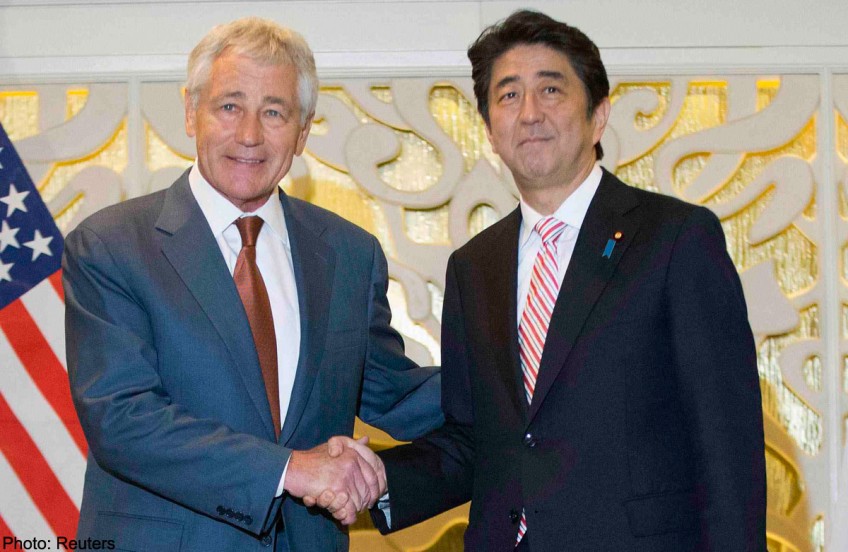Beijing will 'wait and see' over US row

BEIJING - Just days after China openly accused the United States and Japan of ganging up on it at a security forum in Singapore, state media is urging the Chinese government to "pay back in kind".
But Chinese analysts say Beijing is likely to adopt a wait-and- see approach and only consider retaliating with measures such as legal action against American firms for alleged cyber espionage if the situation worsens.
"The best response is to ignore such accusations and to continue doing what we had planned to do," foreign policy analyst Xue Li, of the Chinese Academy of Social Sciences (CASS), told The Straits Times. "If we stop doing something because of criticisms from others, it would only show we do not have a clear policy objective."
US Defence Secretary Chuck Hagel and Japanese Prime Minister Shinzo Abe, speaking at the Shangri-La Dialogue last weekend, said China had stoked regional tensions with what it called provocative actions in territorial disputes with its neighbours.
In its spats with Japan in the East China Sea and with four ASEAN nations and Taiwan in the South China Sea, China has faced frequent criticism that it is disrupting regional stability with such moves as launching an air defence zone and moving an oil rig into contested waters.
The remarks by Mr Hagel and Mr Abe prompted Lieutenant- General Wang Guanzhong of the People's Liberation Army (PLA), who headed the Chinese delegation to the forum, to, for the first time, publicly accuse the US and Japan of being in cahoots, say observers.
But Beijing has been blaming Washington for emboldening its allies in the territorial disputes, particularly after US President Barack Obama's April tour of Asia during which he pledged military protection to Japan and the Philippines in the event of an attack.
Yesterday, the nationalistic Global Times, which is linked to the Communist Party, said in an editorial that "Beijing's patience is limited" and "the overbearing attitude of Washington and Tokyo compels Beijing to consider paying back in kind".
Referring to a new model of avoiding conflicts between an existing power and a rising one agreed by US President Barack Obama and Chinese President Xi Jinping in June last year, the Global Times accused Washington of having no interest in building such a relationship.
"Only when it realises that confronting China costs more than cooperating will it mull over the latter option," it added.
Beijing is justified in having Gen Wang deliver its response, given the "loss of face" caused by remarks made by Mr Hagel and Mr Abe, say analysts.
Peking University's North-east Asia expert Wang Dong said China might consider taking legal action against the Americans for cyber crimes, much the way the US Justice Department last month indicted five PLA officers for economic cyber-espionage.
Associate Professor Xue, director of CASS' international strategy department, believes China could be "more assertive" over its territorial claims, but does not think Beijing would risk launching an air defence zone in the South China Sea, like it did in the East China Sea last November.
Renmin University's Sino-US expert Shi Yinhong told The Straits Times: "Economic sanctions might be possible but only if the US does it first."
Others believe the lead-up to the Sino-US Strategic and Economic Dialogue in Beijing early next month has become more crucial for bilateral ties.
"To some extent, some exchange of harsh words is understandable. It is now up to the leaders on both sides to decide what they want to do - whether they want to recalibrate and tone down the rhetoric. But it takes two to tango," said Prof Wang.
Mr Vikram Nehru, of the Carnegie Endowment for International Peace in Washington, said the US and China need to find a way to work with each other, despite deep mutual distrust. "Both sides need to make sure that their successes, not their disagreements, define and shape their relationship," he told The Straits Times.

This article was first published on June 4, 2014.
Get a copy of The Straits Times or go to straitstimes.com for more stories.